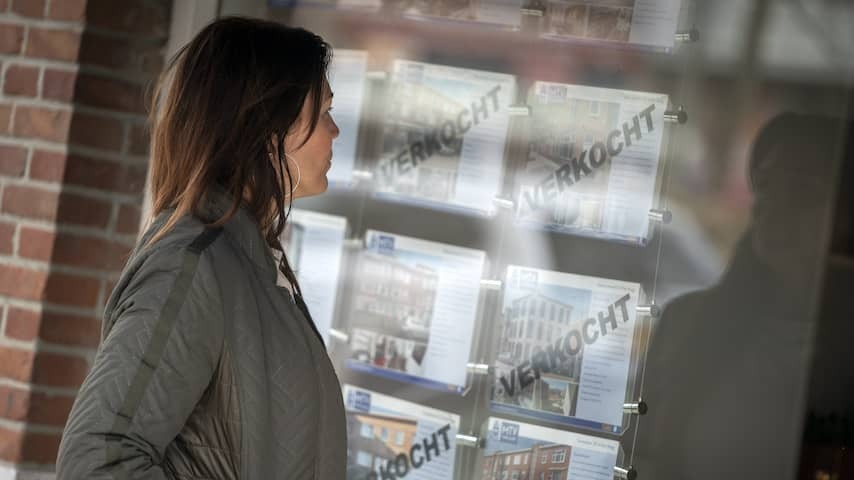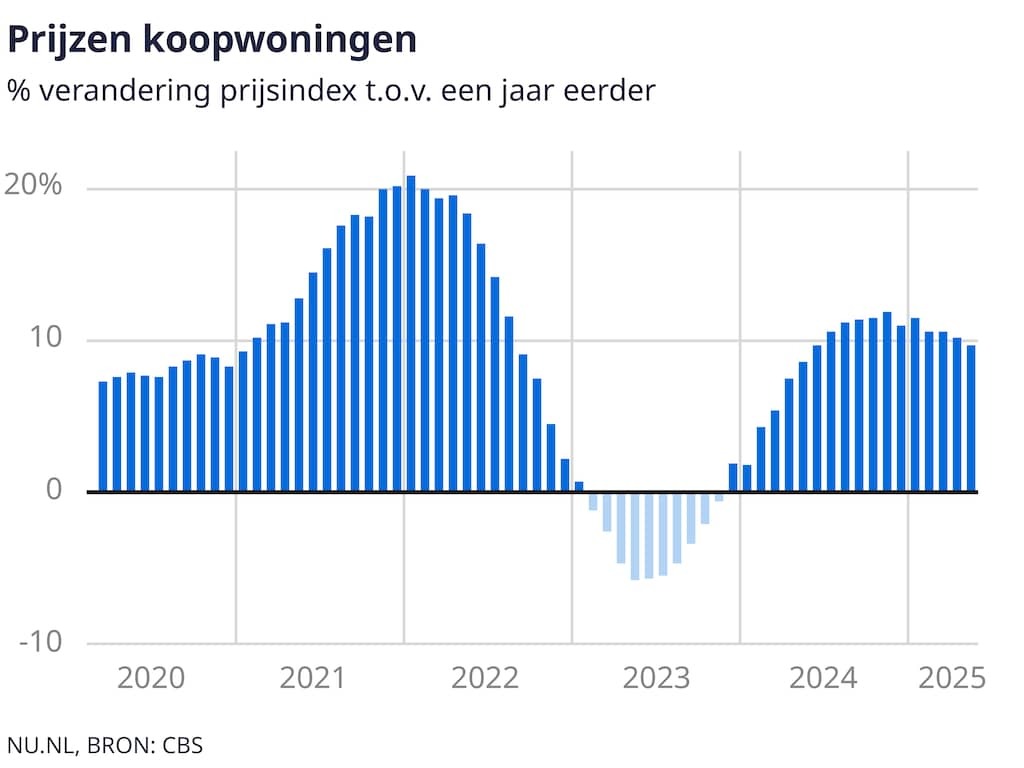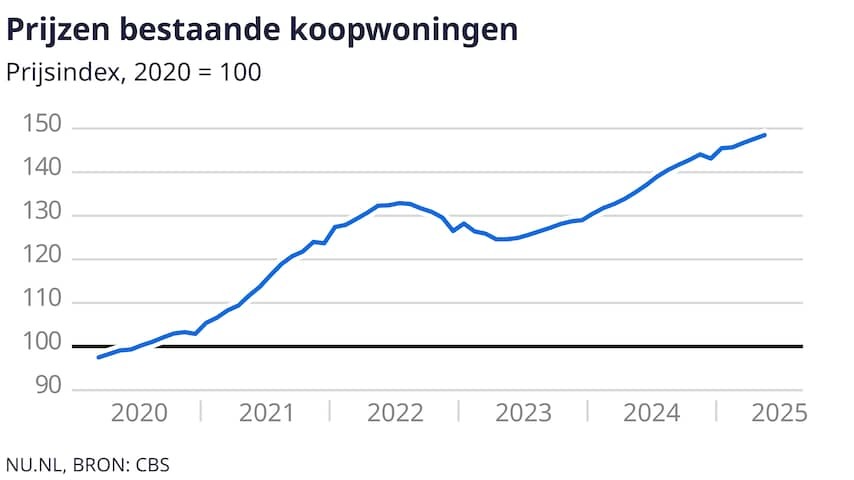
Ondanks de economische onzekerheid blijven de woningprijzen in Nederland stijgen. In mei waren de koopwoningen bijna 10 procent duurder dan een jaar eerder en de gemiddelde verkoopprijs was 471.875 euro. Een koophuis is weer wat minder bereikbaar geworden.
Al een jaar liggen de prijzen zo’n 10 procent hoger dan een jaar geleden, blijkt uit de nieuwe cijfers van het Kadaster en statistiekbureau CBS. Onderstaande grafiek laat de prijsontwikkeling zien. “Toch spannend om te zien dat de prijzen niet alleen op jaarbasis maar ook maand op maand blijven stijgen”, zegt Matthieu Zuidema, woningmarktexpert van het Kadaster. In vergelijking met april waren de woningen 0,6 procent duurder.
“De aanhoudende stijging is opvallend in het licht van de economische onzekerheid”, zegt Zuidema. De handelsoorlog zorgt voor onzekerheid en de economie groeit niet snel. Onlangs bleek dat de groei van de Nederlandse economie in het eerste kwartaal is afgevlakt tot 0,1 procent in vergelijking met het voorgaande kwartaal.
Er zijn wel redenen dat de woningprijzen blijven stijgen, zegt Zuidema. “De inkomens stijgen eigenlijk heel normaal en de rente doet niets geks. In 2023 daalden de woningprijzen nog, dus nu is er ook sprake van een soort inhaaleffect. Maar het is zo’n bijzonder jaar en dat zie je helemaal niet terug in de woningprijzen.”
Een koopwoning is nu bijna 50 procent duurder is dan in 2020, blijkt uit onderstaande grafiek.
Mensen willen nog steeds een huis en de nieuwbouw blijft lastig
Het kopen van een woning wordt steeds moeilijker, zegt Nic Vrieselaar, woningmarkteconoom bij Rabobank. “In 2022 steeg de rente, waardoor mensen minder konden lenen, wat een koophuis minder bereikbaar maakte. In 2023 en 2024 stegen de inkomens, wat de bereikbaarheid juist verbeterde. Bovendien kwamen toen huizen op de markt van beleggers die hun huurwoningen verkochten. Daarom was 2024 een soort sweet spot. Even was een huis wat bereikbaarder.”
“De prijzen stijgen nu weer zodanig hard dat een koopwoning minder bereikbaar is geworden. We gaan zo verder op het pad van de afgelopen 25 jaar. Dat is hoe wij ernaar kijken.”
“We zien dat huishoudens die anderhalf keer modaal verdienen, niet meer ertussen komen. Straks is twee keer modaal nodig, met een bijdrage van rijke ouders.” Hij verwijst naar een ING-onderzoek uit april waaruit blijkt dat mensen die hun eerste huis weten te bemachtigen, steeds welvarender zijn en steeds vaker vermogen geschonken krijgen door hun ouders.
Als de uitpondgolf eindigt
Steeds minder mensen onder de 45 bezitten een koophuis, constateerde Rabobank begin deze maand nog. Veel jongeren zouden simpelweg de moed hebben opgegeven dat ze een woning kunnen kopen.
Vrieselaar verwacht dat de prijzen dit jaar blijven stijgen. “Mensen willen nog steeds een huis kopen en de nieuwbouw blijft lastig.”
Momenteel is er ook een uitpondgolf bezig van beleggers die hun huurwoningen verkopen. Het gaat om grote aantallen woningen die op de markt komen en de woningprijzen drukken. Als die uitpondgolf is afgelopen, vermindert het aanbod waardoor de druk op de woningmarkt groot blijft, zegt Vrieselaar. “Als het gaat om de bereikbaarheid van een koopwoning voor starters, zijn wij dus vrij pessimistisch over de huizenmarkt.”
Despite the economic uncertainty, house prices in the Netherlands continue to rise. In May, owner-occupied homes were almost 10 percent more expensive than a year earlier, and the average selling price was 471,875 euros. Owning a home has become a little less accessible again.
Prices have been about 10 percent higher than a year ago for a year, according to new figures from the Land Registry and statistics office CBS. The graph below shows the price development. “It’s still exciting to see that prices continue to rise not only on an annual basis but also month on month,” says Matthieu Zuidema, housing market expert at the Land Registry. Compared to April, homes were 0.6 percent more expensive.

“The continued increase is striking in light of the economic uncertainty,” says Zuidema. The trade war is causing uncertainty and the economy is not growing quickly. It recently emerged that the growth of the Dutch economy in the first quarter slowed to 0.1 percent compared to the previous quarter.
There are reasons why house prices continue to rise, says Zuidema. “Incomes are actually rising very normally and interest rates are not doing anything crazy. House prices fell in 2023, so there is also a kind of catch-up effect. But it is such a special year and you don’t see that at all in the house prices.”
A home is now almost 50 percent more expensive than in 2020, as shown in the graph below.

People still want a house and new construction remains difficult
Buying a home is becoming increasingly difficult, says Nic Vrieselaar, housing market economist at Rabobank. “In 2022, interest rates rose, making it more difficult for people to borrow, which made owning a home less accessible. In 2023 and 2024, incomes rose, which actually improved accessibility. In addition, houses came on the market from investors who sold their rental properties. That is why 2024 was a kind of sweet spot. For a moment, a house was a bit more accessible.”
“Prices are now rising so rapidly again that owning a home has become less accessible. We are continuing on the path of the past 25 years. That is how we look at it.”
“We see that households earning one and a half times the median income can no longer get in between. Soon twice the median will be needed, with a contribution from wealthy parents.” He refers to an ING survey from April which shows that people who manage to obtain their first home are increasingly prosperous and are increasingly given assets by their parents.
When the sale wave ends
Fewer and fewer people under the age of 45 own a home, Rabobank noted earlier this month. Many young people have simply given up hope that they can buy a home.
Vrieselaar expects prices to continue to rise this year. “People still want to buy a house and new construction remains difficult.”
There is also currently a sale wave underway from investors selling their rental properties. This involves large numbers of homes coming onto the market and putting pressure on house prices. If that sale wave ends, the supply will decrease, meaning that the pressure on the housing market will remain high, says Vrieselaar. “When it comes to the accessibility of a home for first-time buyers, we are therefore quite pessimistic about the housing market.”